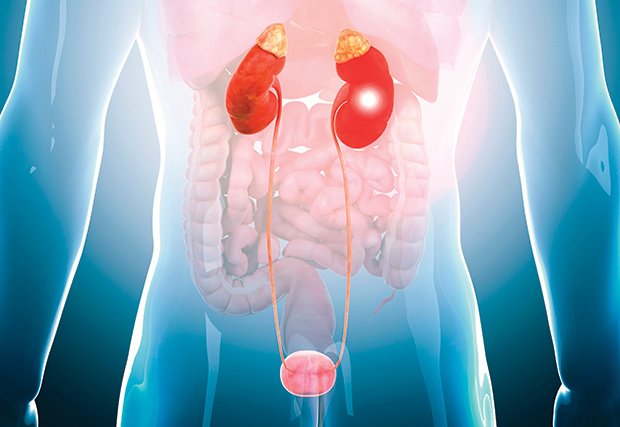
 Anyone who has had a kidney stone knows they are no laughing matter. There can be many contributing factors, including family history, diet and dehydration. Urologist Darren Mack, MD, and Jessica Luke, DNP, share information on what causes kidney stones, how they are treated, and how you can help prevent them.
Anyone who has had a kidney stone knows they are no laughing matter. There can be many contributing factors, including family history, diet and dehydration. Urologist Darren Mack, MD, and Jessica Luke, DNP, share information on what causes kidney stones, how they are treated, and how you can help prevent them.
Q: What are kidney stones and what can cause them?
Kidney stones are formed from high concentrations of calcium, phosphorus or oxalate present in the urine. Most times, they pass through the urinary tract, but larger stones can get stuck and block urine flow. This can cause extreme pain and can lead to infection or even kidney failure. Risk factors include a family history of kidney stones and eating a diet high in protein, sodium or high-oxalate foods, such as dark leafy vegetables and chocolate. Having gout can put you at an even higher risk.
Q: What are the symptoms?
Signs of a possible kidney stone can include severe pain on either side of the lower back; pain near the stomach or a stomach ache that won’t go away; blood in the urine; nausea or vomiting; fever and chills; urine that has a foul odor or looks cloudy; or urgency and frequency of urination. However, symptoms may not be present until the stone starts to descend into the urinary tract, and even then, you may not realize the kidney stone is the source of your pain.
Q: How are kidney stones treated?
Treatment can include medication and increased fluid intake or minimally and non-invasive surgical techniques. Medication allows the ureters to relax, and increased hydration can enable the stone to pass on its own. A procedure known as ureteroscopy uses a small tube with a tiny camera that is fed through the urethra to the stone. It can then be removed or vaporized with a laser. Another option is Extracorporeal Shock Wave Lithotripsy® (ESWL), that uses ultrasonic waves to break up the stone so it can pass through the urinary tract.
Q: How can you prevent kidney stones?
Once you’ve had a kidney stone, you may develop more. Your doctor can determine the type of stone you had and can advise you about any dietary changes or medications to help. For example, if you had calcium oxalate kidney stones, it’s suggested that you reduce sodium and combine foods with calcium and oxalate. For uric acid stones, you should avoid red meat, liver and other animal organs, and shellfish. Also, drinking plenty of water is essential, as dehydration can lead to the formation of stones when urine becomes concentrated with mineral deposits.
Find a urologist at Aiken Regional >
Individual results may vary. There are risks associated with any surgical procedure. Talk with your doctor about these risks to find out if minimally invasive surgery is right for you.

